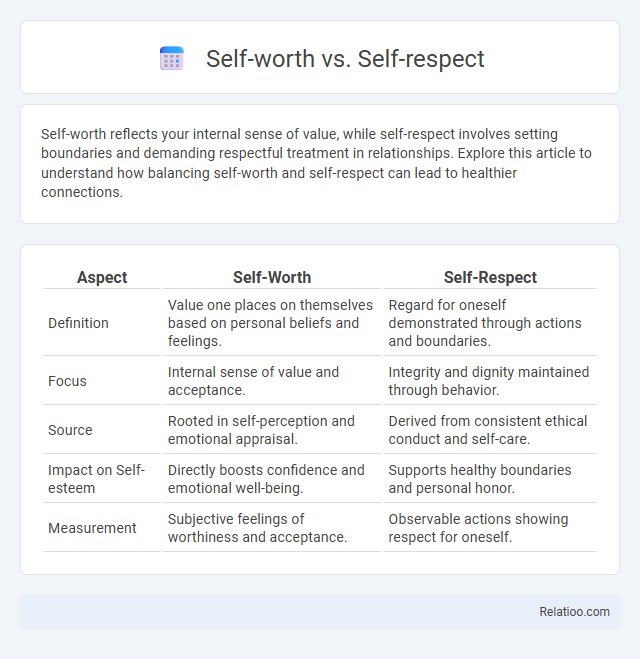Self-worth reflects your internal sense of value, while self-respect involves setting boundaries and demanding respectful treatment in relationships. Explore this article to understand how balancing self-worth and self-respect can lead to healthier connections.
Table of Comparison
| Aspect | Self-Worth | Self-Respect |
|---|---|---|
| Definition | Value one places on themselves based on personal beliefs and feelings. | Regard for oneself demonstrated through actions and boundaries. |
| Focus | Internal sense of value and acceptance. | Integrity and dignity maintained through behavior. |
| Source | Rooted in self-perception and emotional appraisal. | Derived from consistent ethical conduct and self-care. |
| Impact on Self-esteem | Directly boosts confidence and emotional well-being. | Supports healthy boundaries and personal honor. |
| Measurement | Subjective feelings of worthiness and acceptance. | Observable actions showing respect for oneself. |
Defining Self-Worth and Self-Respect
Self-worth is the intrinsic value one assigns to oneself based on personal beliefs and experiences, reflecting overall self-esteem and confidence. Self-respect involves honoring personal boundaries and maintaining dignity through consistent behaviors aligned with one's values. Both concepts underpin an individual's sense of worth, yet self-worth is more internal and emotional, while self-respect manifests through actions and treatment of oneself.
Key Differences Between Self-Worth and Self-Respect
Self-worth represents Your intrinsic value based on internal beliefs about oneself, whereas self-respect reflects how you treat yourself and uphold your personal values and boundaries. Self-worth is often influenced by emotional self-perception, while self-respect involves conscious actions supporting dignity and integrity. Understanding these key differences helps individuals cultivate a balanced sense of identity and maintain healthy interpersonal relationships.
The Psychological Foundations of Self-Worth
The psychological foundations of self-worth involve an internalized belief in your inherent value, shaped by experiences, relationships, and self-perception. Unlike self-respect, which is based on maintaining personal standards and behaviors, self-worth is a deeper sense of intrinsic value that influences emotional well-being and resilience. Understanding the distinction between self-worth, self-respect, and external worth helps cultivate a balanced, healthy self-concept essential for mental health.
The Role of Values in Self-Respect
Self-respect is deeply rooted in personal values, serving as the foundation for maintaining dignity and boundaries in relationships. Unlike self-worth, which reflects an overall sense of value influenced by external validation, self-respect depends on how consistently one acts in alignment with core beliefs and ethical standards. Cultivating self-respect strengthens internal motivation and resilience by prioritizing values over external approval.
How Upbringing Shapes Self-Worth and Self-Respect
Upbringing plays a crucial role in shaping self-worth by influencing how individuals internalize their value through consistent positive reinforcement and emotional support. Self-respect develops when boundaries are taught and respected during childhood, fostering a strong sense of dignity and personal integrity. The foundation laid by caregivers directly impacts both self-worth and self-respect, determining how individuals perceive their worthiness and maintain their principles against external pressures.
Signs of Healthy Self-Worth
Signs of healthy self-worth include recognizing your intrinsic value without relying on external validation, setting personal boundaries that protect your mental and emotional well-being, and maintaining a balanced perspective on your strengths and weaknesses. Your self-respect is reflected in how you honor your values and treat yourself with kindness and dignity, while worth encompasses both your self-perception and the respect you command from others. Cultivating these qualities fosters confidence, resilience, and authentic self-acceptance.
Indicators of Strong Self-Respect
Indicators of strong self-respect include the ability to set personal boundaries, maintain integrity in challenging situations, and make decisions aligned with core values. Individuals with high self-respect demonstrate consistent self-care, refuse to tolerate disrespect, and communicate assertively without fear of judgment. Unlike self-worth, which focuses on internal value, and worth referring to external validation, self-respect is reflected in actions that honor one's own dignity and ethical standards.
Self-Worth and Self-Respect in Relationships
Self-worth in relationships reflects your intrinsic value and belief in your deserving love and kindness, while self-respect ensures you uphold boundaries and demand honorable treatment. Prioritizing self-worth empowers you to recognize your unique qualities, whereas self-respect prevents tolerance of disrespect or harmful behavior. Balancing self-worth and self-respect fosters healthier, more fulfilling connections grounded in mutual care and integrity.
Building Both Self-Worth and Self-Respect
Building self-worth involves recognizing your inherent value independent of external achievements, while self-respect centers on honoring your principles and maintaining personal boundaries. Enhancing both requires consistent self-reflection, affirming your strengths, and making choices aligned with your core values. Cultivating these qualities leads to improved mental health, stronger relationships, and a more resilient sense of identity.
Overcoming Challenges to Self-Worth and Self-Respect
Overcoming challenges to self-worth and self-respect requires recognizing your intrinsic value beyond external validation and setting healthy boundaries to protect your mental well-being. Building self-worth involves consistent self-compassion and affirming your unique strengths, while maintaining self-respect demands integrity and staying true to your core values under pressure. Cultivating both empowers you to navigate adversity with resilience, fostering a balanced sense of personal worth that supports long-term growth and confidence.

Infographic: Self-worth vs Self-respect
 relatioo.com
relatioo.com